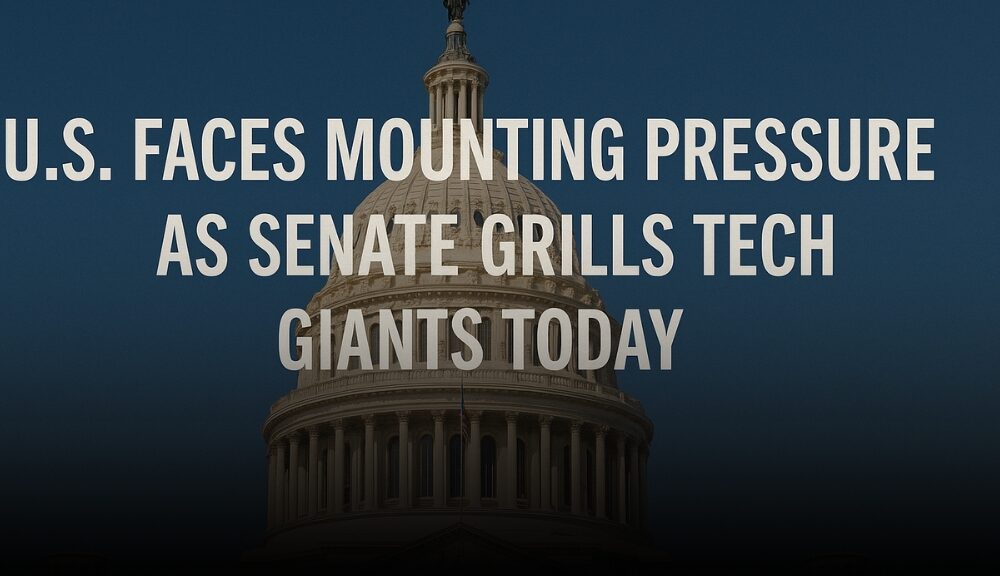Entertainment
U.S. Faces Mounting Pressure as Senate Grills Tech Giants Today

On July 30, 2025, both BBC News and CNN reported significant developments in the U.S. regarding artificial intelligence (AI) regulation. As the European Union and Canada advance strict AI oversight policies, the U.S. government is finally showing signs of catching up. Tech CEOs from top companies were summoned to a high-level Senate hearing, sparking a fresh wave of debate on ethics, data privacy, and innovation.
Table of Contents
| Section | Summary |
|---|---|
| 1. Global Push for AI Regulation | How other nations are leading the way |
| 2. U.S. Senate Grills Tech CEOs | Details of the closed-door hearing |
| 3. Public Trust and Concerns | What Americans really think about AI |
| 4. The White House Response | Federal stance and proposed guidelines |
| 5. What’s Next? | Possible future legislation |
Global Push for AI Regulation
| Country | Recent Action | Highlights |
|---|---|---|
| EU (Europe) | Enforced AI Act (July 2025) | Bans real-time facial recognition, enforces transparency |
| Canada | Passed AI and Data Act | Strict testing before AI products can be released |
| U.K. | Advisory Framework | Focus on AI safety and public accountability |
| U.S. | Still under discussion | Although there is no formal law, Senate hearings are underway. |
BBC noted that the U.S. is lagging in policy despite being home to the world’s largest tech firms
U.S. Senate Grills Tech CEOs
| Tech Company | CEO Present | Key Issue Raised |
|---|---|---|
| Meta | Mark Zuckerberg | Misinformation and political manipulation |
| Google (Alphabet) | Sundar Pichai | AI bias in search and advertising |
| OpenAI | Sam Altman | Chatbot misuse and job displacement |
| Amazon | Andy Jassy | Surveillance tools and facial recognition |
CNN reported that this was one of the most intense tech hearings in recent memory. Senator Elizabeth Warren warned that,
“AI can’t be the wild west anymore | it’s time to take control before it takes control of us.”
Public Trust and Concerns
| Concern | Percentage of Americans Concerned (CNN Poll) |
|---|---|
| Job loss due to automation | 67% |
| Bias in AI decision-making | 58% |
| AI used for election interference | 61% |
| The government is not doing enough | 70% |
A growing majority now supports federal regulation of AI. BBC highlighted public fears that corporate AI is growing faster than public oversight.
The White House Response
| Action | Description |
|---|---|
| AI Principles Document | Released July 30 by the Biden administration |
| Focus Areas | Fairness, transparency, innovation, safety |
| Legal Standing | Non-binding guidelines (not yet law) |
The White House urged Congress to act swiftly and mentioned that a national AI strategy is in draft form, expected to be released in the Fall of 2025.
What’s Next?
| Upcoming Action | Expected Timeline |
|---|---|
| Draft of U.S. AI Regulatory Framework | September 2025 |
| Second Senate Hearing (public) | Mid-August 2025 |
| Industry Feedback Submission Deadline | August 10, 2025 |
| Possible AI Regulation Bill | Q4 2025 |
Analysts warn that a delay in action could result in economic backlash, as global partners may avoid working with unregulated U.S. AI platforms.
Conclusion
The events of July 30, 2025, mark a turning point in the U.S. AI regulation debate. With global momentum building and internal pressure mounting from both lawmakers and citizens, the United States must decide: will it lead the world in responsible innovation, or be left behind in a tech-driven future?